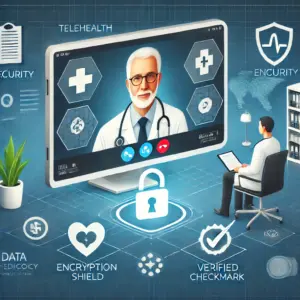Technology
Telehealth Regulations and Privacy: What Patients Should Know
In an era when remote healthcare is becoming more accessible, it is critical for the healthcare industry to address privacy and security concerns to ensure patient safety and privacy. However, health information technology raises privacy and security concerns. At NextClinic, we use cutting-edge technology and highly specialized, comprehensive healthcare provided by trailblazing medical professionals to change lives.

With technological advancements and the adoption of digital platforms for health care delivery, the security of sensitive patient information has never been more important. In this blog, we will delve into the world of telehealth software security, discussing the significance of patient data security and best practices for providing secure and dependable telehealth services.
Providers receive continuous training and awareness
Our panellists agreed that telehealth providers and staff require ongoing training on privacy and security best practices from experts to ensure that they understand their responsibilities and are capable of protecting PHI.
Online Prescriptions
There is significant variation in how different states have approached online controlled substance prescribing. The most flexible states require the formation of a patient-physician relationship for online prescribing, which can be established through telehealth. Other states require an in-person evaluation within a certain time frame before online prescribing can take place.
Sharing secure information online
When entering personal or health information, only use secure websites that display a lock icon in the address bar. Passwords are required for all virtual visits, and patient information must be verified while the patient is in the “waiting room.” For patients receiving telehealth visits, do not schedule a telehealth appointment or share personal information with an unknown provider; instead, use a regular provider’s main phone number to verify their identity.
Professional Board Standards
Most states do not have specific professional board standards for family physicians who practise telehealth. The limited number of states with any standards highlighted the importance of providing the same high level of care as in-person care. Use NextClinic to obtain prescriptions, medical certificate online, and referrals.
Remember to make a recording
Providing care to patients via telehealth requires physicians and other practitioners to keep medical records in accordance with their specific licensure requirements. Detailed record keeping is required to justify the care provided, comply with applicable laws, and support reimbursement claims.
Schedule your telehealth appointment in a private space
Find a location away from others where you can control who hears and sees your conversation. If you are unable to find a private location for your appointment, consider wearing headphones, positioning your computer or mobile device so that others cannot see your screen, and avoiding using the speakerphone.
If possible, use a personal computer or smartphone
Avoid conducting your telehealth session on a computer, mobile device, or network that is connected to your workplace or a public location. Some workplaces and public places can monitor what you do while using workplace devices or unsecured public networks.
Ensure reimbursement for telehealth services
Make coding updates in the chargemaster to ensure that billing codes meet payor specifications. Provide coding education to providers and office coding and billing personnel. Ensure that documentation for telehealth services is consistent and meets billing requirements. Use documentation templates or checklists for payor-specific requirements, and use automatic time-tracking within the organization’s EHR to select CPT codes.
Keep up with recent legal developments
Laws and regulations evolve much more slowly than technology does. Telehealth practitioners must stay current on federal regulatory requirements as well as in all states where they provide telehealth services, and ensure that they have robust policies and procedures in place to help them stay compliant.
Pay close attention to corporate structure
A number of states prohibit corporate practice of medicine, which has an impact on how a telehealth platform is structured. Thus, compliance with corporate practice of medicine laws, including affiliation with a physician practice or friendly physician entity, must be considered when providing professional medical services in states where the corporate practice of medicine is prohibited.
Conclusion
Psychologists should prioritise patient privacy and data security. Consider purchasing cyber coverage as a critical risk mitigation tool, just as you would professional liability insurance for your psychology private practice. Seeking advice from an attorney, insurance broker, risk management professional, and IT health care professional will provide you with the resources and information you need to mitigate risk and reduce your practice’s vulnerability to a privacy or cyber-related incident.














